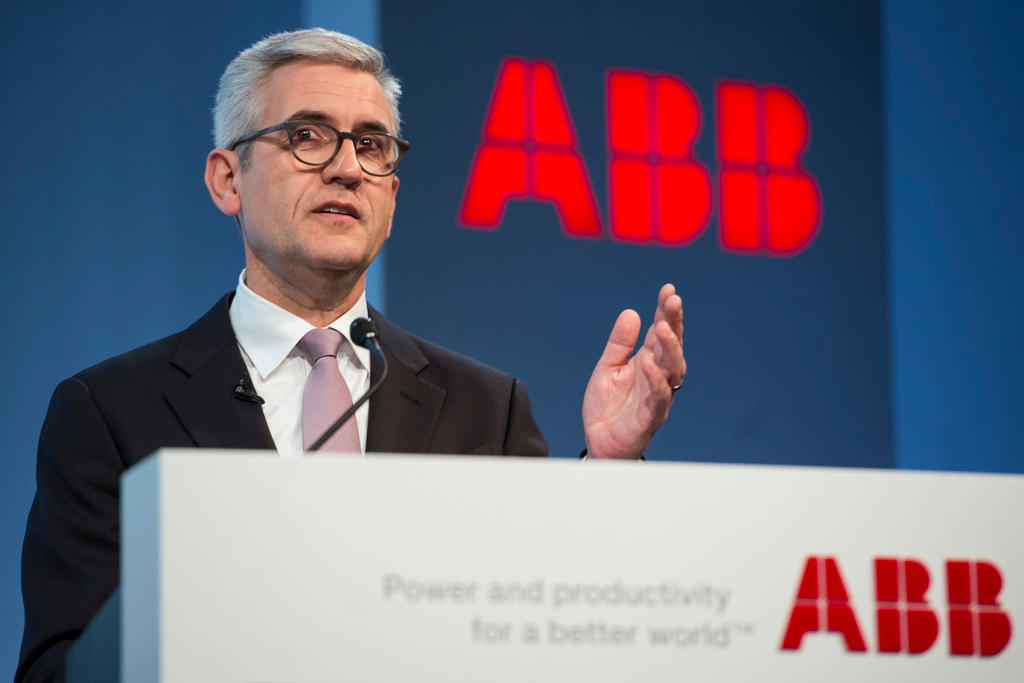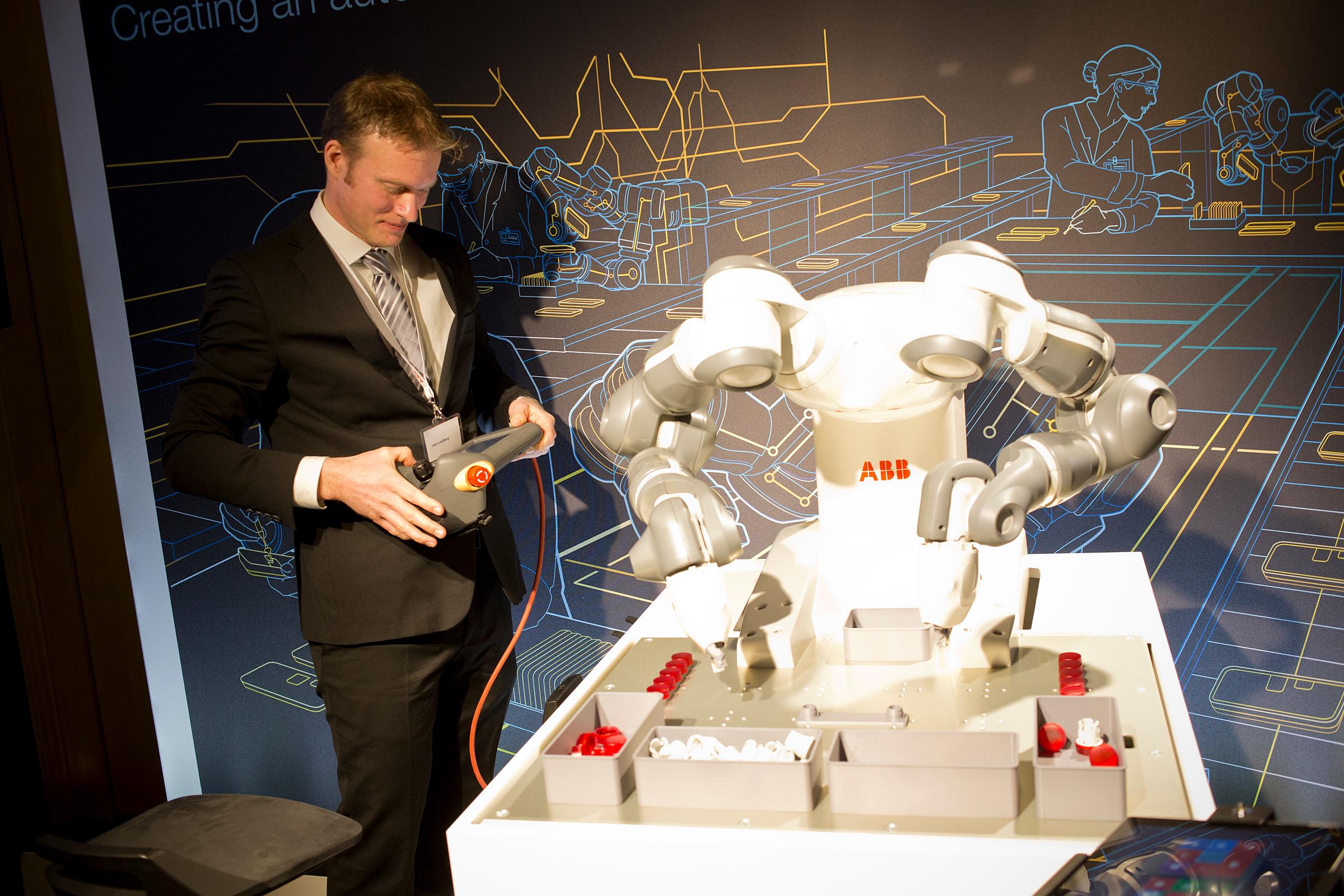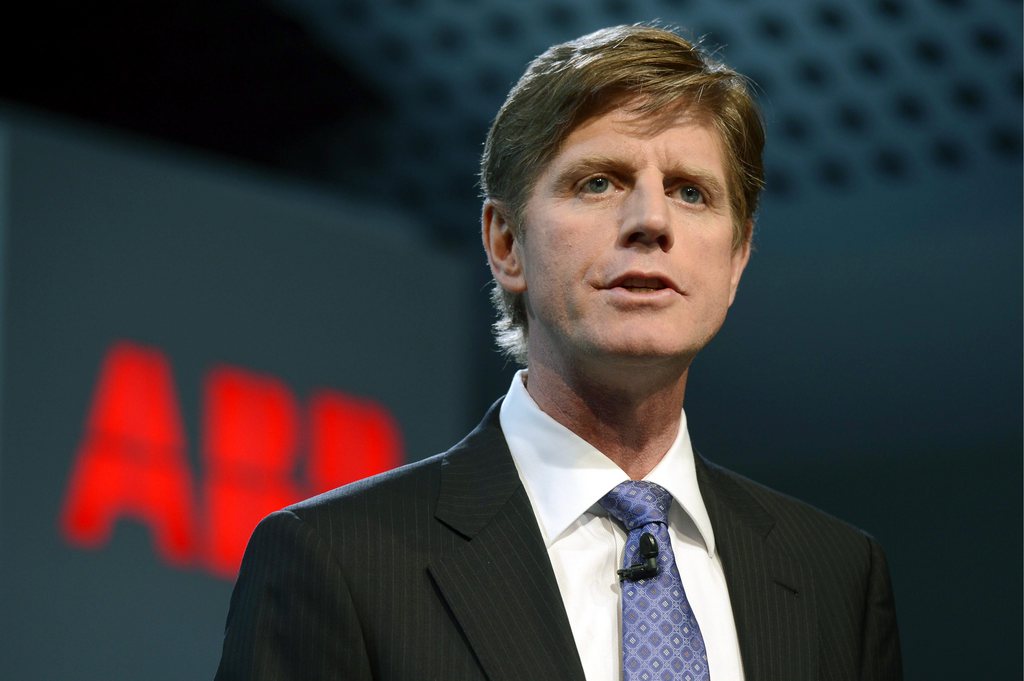ABB’s ‘Mr Robot’

Six years ago, Ulrich Spiesshofer went into battle with robots.
The former management consultant had taken over the ailing robotics division of Swiss engineering group ABB. Its robots were too expensive and pitched largely at the auto industry, which was in a severe downturn. Operating losses in robotics hit almost $300m in 2009.
“It was bleeding like hell,” Mr Spiesshofer recalls. “A lot of people said ABB should dump robotics . . . We should get rid of it.”
But ABB stood its ground. “We took the time and went through a portfolio review and said, ‘We’re going to keep this because we believe in the end market.’” Under Mr Spiesshofer, ABB broadened its range of robots, increased their intelligence and reduced dependence on sales to carmakers.

More
Financial Times
External linkThe gamble paid off. The global robot market has grown rapidly and “robotics is a rock star in our portfolio”, he says.
Energy revolution
Since 2013, when Mr Spiesshofer became ABB’s chief executive, his job has been to boost performance across a sprawling conglomerate, which had revenues of $35bn last year and employs 135,000 in businesses ranging from high voltage switchgear used in power networks to parts for turbines and transport systems, as well as factory automation.
It is not a simple task. While competition in robotics remains fierce, Mr Spiesshofer has pushed ABB into latest-generation collaborative robots, or co-bots, which interact with human workers and improve safety. They also allow manufacturers to reduce overheads in European countries where costs are high.
Last month, he poached a Siemens executive, Sami Atiya, to head the division that includes robots. ABB’s robotics unit “has changed completely [since 2009]. It is a much leaner business focused on the higher value end of the market,” says James Stettler, an analyst at Barclays.
But the ABB group has wider interests than robots. It was formed in 1988 from Sweden’s Asea and Switzerland’s Brown Boveri. The energy industry – a big customer – is in the middle of a revolution. Low oil prices have hit investment spending, while a shift to renewable energy requires more sophisticated systems for transmitting electricity to customers. New clients want power for databases or electric vehicles.
Activist investors
Across industries, sluggish economic growth means clients demand software, communications and computing power that boost their efficiency and cut costs. But competition is rising from ABB’s rivals in emerging economies – and ABB says it is watching closely the economic fallout from the UK vote to leave the EU.
All of which raises the question of whether any manager can successfully pilot such a complex company.
Perhaps not. Since 2009, ABB’s share price has underperformed those of rivals such as Germany’s Siemens, or Honeywell in the US. The company has struggled to shake off an image as a conservative Swiss engineering group.
Lurking on the sidelines is Cevian Capital, the activist Swedish investment fund, which owns 5.2 per cent of ABB’s shares and is lobbying for structural change. A further 10 per cent of the shares are owned by Investor, the investment vehicle of Sweden’s billionaire Wallenberg family.
Common glue
Mr Spiesshofer, a hobby yachtsman, admits that in his job “you really need to fly by sight”. But, speaking at ABB’s headquarters, next to a railway station in a Zurich suburb, he appears undaunted.
A fast talker – whether in English or German – the 52-year-old fizzes with a management consultant’s energy.
When he joined ABB as head of corporate development in 2005 from Roland Berger strategy consultants, the group was recovering from near-disaster. After aggressive expansion over the previous decade, which had left it with high debt levels, ABB came close to bankruptcy in 2002 as a result of massive asbestos-related legal claims against a US subsidiary. The group pulled back from the brink, but remained an unwieldy, decentralised global collection of businesses.
Mr Spiesshofer believes ABB should remain a conglomerate – in which businesses in different sectors share common central functions. The pieces, he says, are held together by technology – in power electronics, material sciences and digitalisation, as well as shared back-office services.
“There is a common glue – where you have scale, where you have technology, competencies you can use across the wide range of the portfolio,” he says. ABB can also leverage its expertise and balance sheet to provide a platform for tech start-ups – as it is, for example, in Shanghai.
Portfolio review
The trick, says Mr Spiesshofer, is not to “strangle” the entrepreneurship of individual managers. “If you play that right, and you give your business leaders the oxygen, then the conglomerate [structure] is absolutely giving you a competitive advantage – but only then.”
Nevertheless, ABB is reviewing what belongs in its portfolio. Last September, Mr Spiesshofer unveiled a package of measures to boost operating and share price performance. Included was a suggestion that it could spin off its newly formed power grids division, which had revenues of almost $12bn last year and pulled together businesses supplying the power generation, transmission and distribution sectors.
The argument for selling would be that the division has few synergies with other ABB businesses – robots, for instance. In Zurich, the widely held assumption is that Cevian would prefer a sale. But it is not clear that will be the outcome of the portfolio review, which will be announced in October – especially given the precedent Mr Spiesshofer set with the robotics division.
The power grids division is “a number one business, which is much better organised today”, he says. What is more, the division faces just the sort of complex market environment in which the ABB boss appears to revel. While emerging markets are investing in infrastructure, energy policies are changing radically in Europe – Germany, for instance, is closing its nuclear power plants – with huge knock-on effects for transmission systems.
“We are entering a decade of probably the most dynamic changes in the power grid that we have ever observed in mankind’s history,” says Mr Spiesshofer.
He has made sweeping changes within the company by streamlining ABB’s organisation. “ABB used to be a pretty complex company, where it was not exactly clear who was doing what,” he admits.
Paring back management
His senior management team has been cut from 14 to seven. The number of back-office support centres is being reduced globally from 68 to two main centres, in Krakow and Bangalore, plus four smaller regional centres.
Savings of $1bn a year have been targeted by next year in a white collar productivity programme, which it is hoped will lead to quicker decisions by sales teams.
Will it be enough to satisfy shareholders? Investors may be giving Mr Spiesshofer the benefit of the doubt. Since the start of this year, ABB’s shares have risen 5.3 per cent.
Much will depend on the global economy; a pick-up in growth and infrastructure investment spending would provide a tailwind for ABB’s recovery.
Mr Spiesshofer clears his mind by sailing. “When you don’t concentrate, you fall in the water,” he says.
Has he ever fallen in? “This year, not yet.”
“In robots, Ulrich Spiesshofer’s success was partly good management, but you also had a market that started to boom,” says Takis Spiliopoulos, analyst at Vontobel, who has followed ABB since 2003. “He saw where ABB was number one or two, where gaps were in the portfolio and the market and fixed them.
“Now he’s rolling out the same strategy across the group. He needs to change the culture of ABB, it needs a more comprehensive, solution-selling and service mentality.”
Copyright The Financial Times Limited 2016

In compliance with the JTI standards
More: SWI swissinfo.ch certified by the Journalism Trust Initiative


You can find an overview of ongoing debates with our journalists here. Please join us!
If you want to start a conversation about a topic raised in this article or want to report factual errors, email us at english@swissinfo.ch.